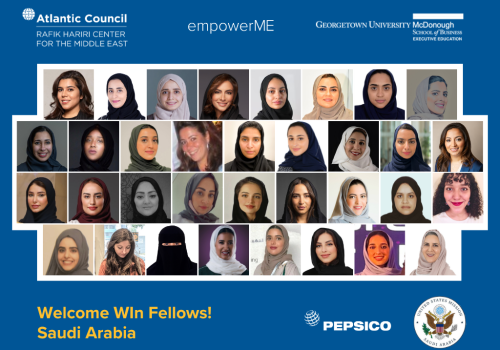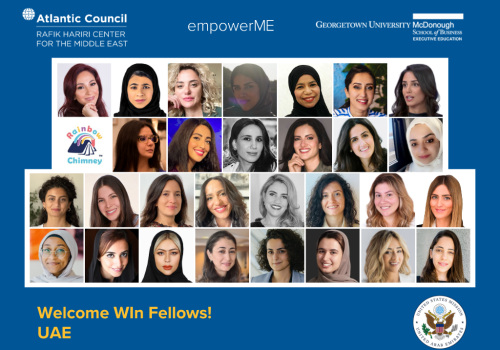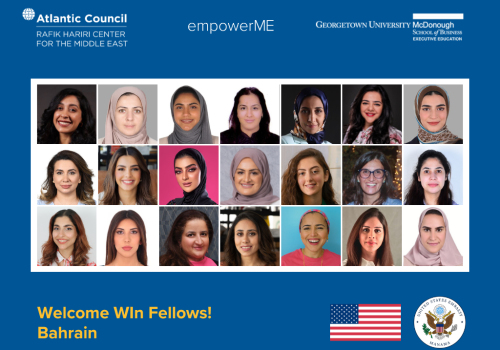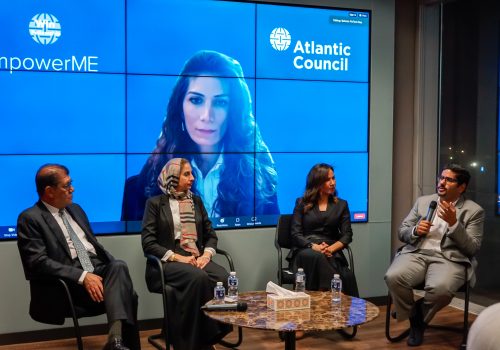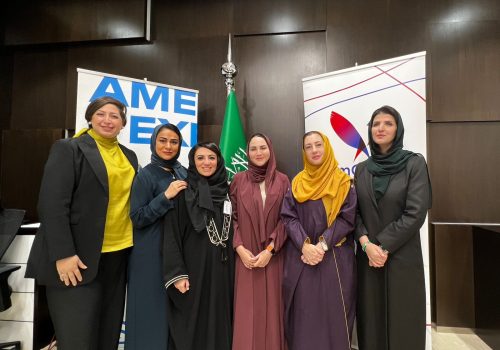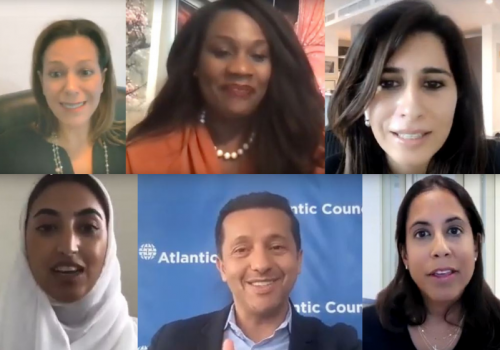Decoding the dynamics of venture capital in the MENA region
On December 12th, 2023, the Atlantic Council’s empowerME initiative, in collaboration with the United States Embassy in Manama, the United States Mission to the United Arab Emirates, the United States Embassy in Saudi Arabia, and PepsiCo, held an insightful WIn Fellowship virtual workshop. This engaging discussion focused on demystifying venture capital (VC) ecosystem, explored its various stages, and shed light on the roles and expectations of VC investors.
Opening remarks were delivered by Lynn Monzer, associate director of the WIn Fellowship at the Atlantic Council. The conversation was led by Amjad Ahmad, chairman of the empowerME initiative at the Atlantic Council, featuring two exceptional speakers: Amal Dokhan, general partner at 500 Global MENA, and Tammer Qaddumi, co-founder & general partner at VentureSouq.
Lynn Monzer highlighted that in the Middle East and North Africa, “women lead fewer than 5 percent of businesses. Interestingly, around 66 percent of these entrepreneurs rely on personal savings and family support instead of actively seeking formal financing.” As of September 2022, only 1 percent of the $374 billion invested in the Middle East went to companies founded or co-founded by women. This reluctance is rooted in a lack of trust and transparency in the venture capital landscape, exacerbated by cultural norms and a predominantly male industry, creating an environment where women find it intimidating to pitch and negotiate.
Main takeaways
Amal Dokhan defined venture capital as high-risk funding for high-risk companies directed towards high-risk companies. She underscored the importance of understanding VC structures, sector preferences, and the capitalization table. She detailed 500 Global’s unique approach, which combines investment with an accelerator model for early-stage founders. The accelerator focuses on evaluating the early stage of a company, ensuring the presence of a foundational team, including at least one founder and a technology-focused Chief Technology Officer (CTO).
Tammer Qaddumi highlighted that venture capital represents just one category of capital among a diverse range of funding options available for businesses. He emphasized the importance of companies to evaluate if venture capital aligns with a company’s specific goals. Qaddumi outlined three criteria for considering venture capital: potential for rapid scaling, substantial upfront time investment before monetization, and a technology centric approach. He cautioned that venture capital, with its equity expenses and long-term partnership, may not be suitable for every business and suggested exploring alternative financing methods. Additionally, he highlighted the value proposition of banks as an alternative to venture capital for financing.
Tammer Qaddumi and Amal Dokhan both emphasized the need for alignment of interests and the significance of selecting an investor who will be a long-term partner for the company. They advised entrepreneurs to understand the investors’ business models, stakeholders, and objectives. Using the example of VentureSouq, Qaddumi underlined the critical importance of aligning with the investor’s specialization, ensuring that the business matches the fund’s focus and objectives. Dokhan discouraged entrepreneurs from pursuing trendy problems without genuine connection or expertise. She stressed the importance of timing, personal commitment, and the defensibility of business models. She favored coachable founders with internal tech expertise and stressed effective communication and compatibility in the investor-founder relationship.
Qaddumi explained that the criteria venture capital firms use to evaluate start-ups are not always consistent. It is in fact a dynamic equation involving an interplay between the team, the product, and the market that lead to entrepreneurial success. But, above all, it is the conviction of the founder that matters. Venture capital firms are drawn to start-ups whose founders are fully committed to the company, with the start-up being their only job. If you are not willing to risk your personal success on your idea, why should investors be?” Qaddumi said.
The significance of a start-up’s founder was a key point made by Amjad Ahmad. He mentioned that there are no new or unique business models anymore, the real value is with the founder. He explained that when a venture capital firm is presented with ten similar business models, they will choose the one with the founder who they believe is the most capable of executing the idea. Echoing this perspective, Qaddumi emphasized the importance of transparency when meeting with investors. Consumers will not buy a product without knowing who is behind the business and how it operates. If investors do not see this openness, they may doubt the business’s scalability and choose not to invest. Dokhan added that she often sees this cagy behavior in first-time founders, often due to advice from lawyers inexperienced with start-ups, who recommend protecting business ideas and requesting non-disclosure agreements. Instead, Dokhan suggested speaking with founders who have recently successfully financed and are in a similar stage as your company, as a more effective strategy.
Amjad Ahmad pointed out that the aim of venture capital, simply put, is to make money. Therefore, firms are looking for an idea that will be big. It is difficult for a start-up to prove their success without first creating their product and engaging in the market on a smaller scale. Dokhan elaborated on the process investors use to de-risk, which involves understanding the business’s components they might invest in. She advised wise founders, when searching for financing, to familiarize themselves with the process, collect evidence, and prepare a comprehensive business plan. Qaddumi advised founders to familiarize themselves with the methods like the BURKE’s method so they are able to meet the financing criteria used by many venture capital firms.
Another key element to securing financing is through networking. Qaddumi suggested leveraging the founder’s network for warm introduction to investors. “At the first meeting, don’t ask for money. Instead, ask for advice or other introductions,” he emphasized. “Build rapport and a relationship with the investor before asking for money. Even if this first opportunity does not pan out, venture capital firms talk to each other and could introduce you to a firm better suited to your field.” Dokhan added that, as an investor, the best way she meets founders is through intros from other founders. If someone in her community refers a founder, she knows that the first round of vetting has already been done.
Finally, in terms of common factors that lead to successful start-ups and investments, both Dokhan and Qaddumi agreed that the ability to market to larger, diverse markets is a key success factor. When it comes to the Middle East, no single country has a large enough population to produce a true business success by venture capital standards. But selling to diverse markets across the MENA region is easier said than done. Dokhan clarified that this not only requires the ability to quickly launch in different countries, but that it is essential to be able to understand customers and their consumer behaviors in different markets. Different countries will need separate strategies and marketing unique to their consumers. Ahmad added that this is an area where venture capital can help the companies, they are investing in. Having investors who are positioned in these different markets can help companies gain understanding and provide important local introductions.
Closing Remarks
In the closing remarks given by Nibras Basitkey, she outlined the guidance panelists provided to founders interested in understanding, navigating, and securing venture capital funding. Venture capital is not suitable for all business models. If you want to pursue this form of financing, you must actively integrate cutting-edge technologies into your startup’s core offerings. You will need to highlight how these technological advancements disrupt the market, tackle a specific problem, and create significant value for investors.
The first step in acquiring venture capital funding is through thorough research. It is necessary to find a firm that aligns with your startup’s specific needs and goals. After that, founders must build a compelling case to sell to investors. Clearly define the problem your startup tackles and be able to articulate its solution; explain how your business will generate substantial returns for investors and show scalability; and be sure to demonstrate your commitment as a full-time founder. Finally, when seeking meetings with investors, utilize your network. Ensure that all introductions are “warm,” coming from shared contacts and always build a rapport and relationship before requesting funding.
Venture capital can be a confusing and intimidating space but with the right tools and knowledge it can grow your startup into a thriving business.
Explore the WIn Fellowship
Recommended content
Sponsors & in-country partner


empowerME
empowerME at the Atlantic Council’s Rafik Hariri Center for the Middle East is shaping solutions to empower entrepreneurs, women, and youth and building coalitions of public and private partnerships to drive regional economic integration, prosperity, and job creation.
